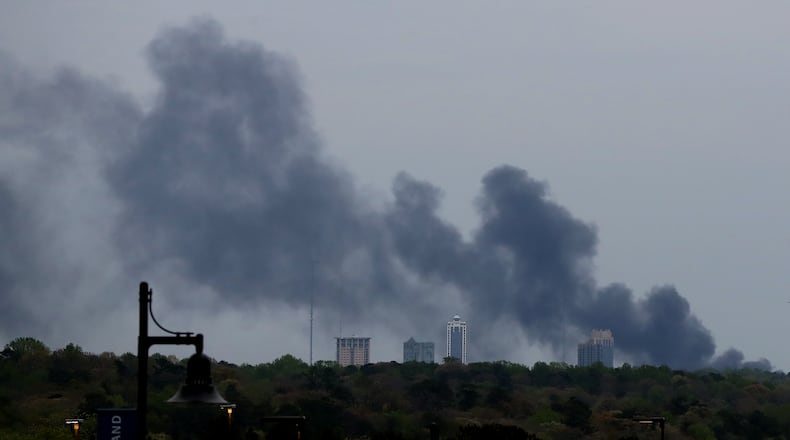Behold, metro Atlanta's new slogan: "If I can get there from here."
It likely won’t win any marketing contests, and chambers of commerce will hate it, but it’ll be on the tip of many and many a tongue over the next two or three months.
And just maybe, it will serve as the rallying cry that we need.
In the early scramble to deal with an interstate set ablaze, Gov. Nathan Deal was asked late Thursday night if the north MARTA line linking downtown with north Fulton and DeKalb counties, which parallels I-85, had been damaged.
He replied that he didn’t yet know. “I hope it was not,” Deal added. Because the governor has come to understand the impact that commuter rail can have in a metropolitan region considered the economic engine of the state.
In fact, MARTA’s north railway had survived unscathed. Even as the governor spoke, transit agency officials were adding more trains to the red and gold lines that extend from it. They, too, understood that a slender rail line had just become a most important economic thread connecting downtown Atlanta with parts north.
Others will need convincing, but there’s no escaping that, once again, the basics of getting around is about to become a dominating political issue in metro Atlanta.
The interstate was still smoldering at 2:35 a.m. Friday when John Eaves, chairman of the Fulton County Commission and a newly announced candidate for mayor of Atlanta, identified our newest traffic misery as a sign of the "underlying issue of the lack of a cohesive and comprehensive transportation plan."
Yet the I-85 collapse really isn’t a city of Atlanta issue. Interstates are a federal, state and regional concern. Which is why the fiery debacle could have a more serious impact in the race for the Sixth District congressional seat of Tom Price. This is the geographic sector most directly affected by the elimination of I-85 as a commuter path.
It is also an area where the topic of commuter rail has been bubbling. Though not, with a few minor exceptions, among the 18 candidates in the congressional contest. So far, the debate has largely been confined to expressions of support or opposition to President Donald Trump.
But think of this. By the time the first round of voting occurs on April 18, many Sixth District voters will have spent two weeks driving like it’s 1992. That was the last year that Ga. 400 dead-ended into I-285, rather than extending to I-85.
“This should continue the discussion on transit – which is a good thing,” said state Sen. Brandon Beach, R-Alpharetta, who has advocated for pushing MARTA rail up through north Fulton, across the Chattahoochee River. “I can tell you that my constituents are sick and tired of sitting in traffic on 400.”
Then there's Gwinnett County, which is as dependent on I-85 as Cobb County is on I-75. In February, Charlotte Nash, chairman of the Gwinnett commission, said she wanted a countywide referendum on transit expansion – but not in 2017.
She may want to rethink that. Now may be the perfect time.
No one is saying that the fiery destruction of a slab of concrete on I-85 is an argument for a wholesale shift to commuter rail. Not even MARTA.
“Thank God, we passed [House Bill] 170 a couple years ago,” said Robbie Ashe, chairman of the MARTA board. He was referring to the nearly $1 billion-a-year gasoline tax hike the Legislature approved in 2015 for road and bridge repair.
“The one thing that I think will become clear is that we need money to maintain, to repair and expand our transportation system. That’s our entire transportation system – of which roads are a predominant part,” Ashe said.
The MARTA chairman doesn’t doubt that his transit agency is about to see a “significant increase” in ridership over the next several months, but he is in no way gloating.
“We obviously regret the circumstance under which this occurs,” Ashe said. The specific phrase he liked was “transportation system resiliency.”
“I think this will probably show that we’re an important part of this. Having alternatives, whether they be alternative roads or alternative trains or whatever, is an important part of resiliency,” Ashe said.
But back to the state Capitol. A measure that gives Cobb County an opening to participate in the negotiation of a 50-year lease on a rail line that shoots from Atlanta to Chattanooga, with the idea of someday bringing commuter rail to Marietta and beyond, was sent to the governor for his signature.
But relatively speaking, that was small stuff. In one of life’s great ironies, while I-85 burned, the Legislature fiddled.
Two bills were poised for passage on the final day of the session. Both HB 160 and SB 6 would have established regional panels to chart out the funding and structure of a regional transit system for Georgia.
Either one of them would have done. Neither of them passed – largely because of the unusual level of acrimony between the House and Senate in the final days.
House Speaker David Ralston has become, with Governor Deal, a top advocate for transit in Georgia. Ralston was the unnamed but chief advocate for HB 160.
When he saw that both bills were about to sink, he launched a lifeboat in the final hours. House Resolution 848, which passed on a 172-3 vote, creates a House-only "Commission on Transit Governance and Funding" that tackles the issue of a state-sponsored transit system for metro Atlanta.
Via email on Friday, Ralston said the commission would “explore how we can integrate transit into our statewide transportation plans moving forward.
“A diverse and robust transportation network is vital to Georgia’s future and I look forward to the House of Representatives leading this important discussion,” Ralston said.
If only it can get there from here.
About the Author



